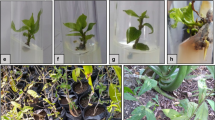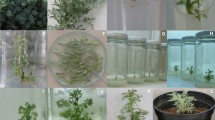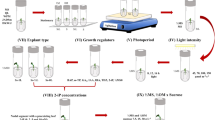Abstract
Tuberaria lignosa (Cistaceae family) has excellent properties as an antioxidant, anti-inflammatory, antimicrobial, and antiproliferative/anti-tumoural. This work aimed to establish a routine micropropagation protocol of T. lignosa to supply high-quality plants for the pharmaceutical industry. Apical shoot cuttings (0.5 cm long) were grown on basal medium Murashige and Skoog (MS) and ½MS for 60 days with different growth regulators. ½MS supplemented with 1 mg L−1 benzylaminopurine (BAP) provided the best results with shoots showing better growth rates and no vitrification or browning. After 60 days, the best results for shoot proliferation were achieved on ½MS with 1 mg L−1 mT, with 100% explants responding and ~ 4 new shoots formed per explant. For elongation and rooting, after 30 days, 1 mg L−1 indoleacetic acid (IAA) provided 100% of rooting (~ 18 roots per shoot), and resulting plants were vigorous, also with no signs of vitrification or browning. For acclimatization, the substrate Jiffy Plug provided the best results after 60 days, with a survival rate of 68.42%. In the subsequent 30 days in greenhouse conditions, all plants survived. Acclimatized plants had still less proteins, but high activity of antioxidant enzymes compared with the mother plants, supporting that these cloned plants may be of interest to the pharmaceutical industry. No changes in the DNA-ploidy were detected between micropropagated and the mother plants. The protocol described here provides, after 8 months of explant establishment, a high number of plants/explants, revealing a high potential for future use in this species and in other medicinal and economically relevant species, and in species in need of ex-situ conservation measures.
Key message
A new ploidy true-to-type micropropagation protocol of the medicinal species Tuberaria lignose provided a large number of plants after explant-inoculation on ½MS (with mT for multiplication) and successful acclimatization.



Similar content being viewed by others

Data availability
Original data will be made available to those who require their access to authors.
References
Ahmed R, Anis M (2014) Changes in activity of antioxidant enzymes and photosynthetic machinery during acclimatization of micropropagated Cassia alata L. plantlets. In Vitro Cell Dev Biol Plant 50:601–609. https://doi.org/10.1007/s11627-014-9609-1
Airò M, Farruggia G, Giardina G, Giovino A (2015) Micropropagation protocol of a threatened species: Cistus crispus L. Acta Hortic 1083:549–552. https://doi.org/10.17660/ActaHortic.2015.1083.73
Alves V, Pinto R, Debiasi C, Santos MC, Gonçalves JC, Domingues J (2021) Micropropagation of Corema album from adult plants in semisolid medium and temporary immersion bioreactor. Plant Cell Tissue Organ Cult. https://doi.org/10.1007/s11240-021-02034-1
Amoo S, Staden J, Van J (2013) Influence of plant growth regulators on shoot proliferation and secondary metabolite production in micropropagated Huernia hystrix. Plant Cell Tissue Org Cult 112:249–256. https://doi.org/10.1007/s11240-012-0230-x
Bairu W, Stirk W, Dolezal K, Staden J (2007) Optimizing the micropropagation protocol for the endangered Aloe polyphylla: can meta-topolin and its derivatives serve as replacement for benzyladenine and zeatin? Plant Cell Tiss Org Cult 90:15–23. https://doi.org/10.1007/s11240-007-9233-4
Bedoya LM, Bermejo P, Abad MJ (2009) Anti-infectious activity in the cistaceae family in the iberian peninsula. Mini Rev Med Chem 9:519–525. https://doi.org/10.2174/138955709788167600
Bedoya LM, Abad MJ, Sanchez-Palomino S, Alcami J, Bermejo P (2010) Ellagitannins from Tuberaria lignosa as entry inhibitors of HIV. Phytomed 17:69–74. https://doi.org/10.1016/j.phymed.2009.08.008
Bhavana GP, Kumudini B, Aswath C (2018) Micropropagation of Anthurium through suspension culture using in vitro shoots. J Appl Hortic 20(3):196–201
Bose B, Kumaria S, Choudhury H, Tandon P (2017) Insights into nuclear DNA content, hydrogen peroxide and antioxidative enzyme activities during transverse thin cell layer organogenesis and ex vitro acclimatization of Malaxis wallichii, a threatened medicinal orchid. Physiol Mol Biol Plants 23(4):955–968. https://doi.org/10.1007/s12298-017-0474-3
Brito G, Lopes T, Loureiro J, Rodriguez E, Santos C (2010) Assessment of genetic stability of two micropropagated wild olive species using flow cytometry and microsatellite markers. Trees Struct Funct 24:723–732. https://doi.org/10.1007/s00468-010-0442-9
Castro M, Castro S, Figueiredo A, Husband B, Loureiro J (2018) Complex cytogeographical patterns reveal a dynamic tetraploid–octoploid contact zone. AoB Plants 10:1–18. https://doi.org/10.1093/aobpla/ply012
Chen S-L, Yu H, Luo H-M (2016) Conservation and sustainable use of medicinal plants: problems, progress, and prospects. Chin Med 11:37. https://doi.org/10.1186/s13020-016-0108-7
Chokheli VA, Dmitriev PA, Rajput VD, Bakulin SD, Azarov AS, Varduni TV, Stepanenko VV, Tarigholizadeh S, Singh RK, Verma KK, Minkina TM (2020) Recent development in micropropagation techniques for rare plant species. Plants 9(12):1733. https://doi.org/10.3390/plants9121733
Coelho N, Gonçalves S, Romano A (2020) Endemic plant species conservation: biotechnological approaches. Plants 9(3):345. https://doi.org/10.3390/plants9030345
Cuenca B, Sánchez C, Aldrey A, Bogo B, Blanco B, Côrrea B, Vidal N (2017) Micropropagation of axillary shoots of hybrid chestnut (Castanea sativa × C.crenata) in liquid medium in continuous immersion system. Plant Cell Tissue Organ Cult 131:307–320. https://doi.org/10.1007/s11240-017-1285-5
Cui Y, Deng Y, Zheng K, Hu X, Zhu M, Deng X, Xi R (2019) An efficient micropropagation protocol for an endangered ornamental tree species (Magnolia sirindhorniae Noot. & Chalermglin) and assessment of genetic uniformity through DNA markers. Sci Rep 9:9634. https://doi.org/10.1038/s41598-019-46050-w
Dias MC, Pinto G, Santos C (2011) Acclimatization of micropropagated plantlets induces an antioxidative burst: a case study with Ulmus minor Mill. Photosynthetica 49:259–266. https://doi.org/10.1007/s11099-011-0028-9
Faisal M, Anis M (2009) Changes in photosynthetic activity, pigment composition, electrolyte leakage, lipid peroxidation, and antioxidant enzymes during ex vitro establishment of micropropagated Rauvolfia tetraphylla plantlets. Plant Cell Tissue Organ Cult 99:125–132. https://doi.org/10.1007/s11240-009-9584-0
Fernandes P, Rodriguez E, Pinto G, De Loose M, Santos C (2009) Cryopreservation of Quercus suber somatic embryos by encapsulation-dehydration and evaluation of genetic stability. Tree Physiol 28(12):1841–1850. https://doi.org/10.1093/treephys/28.12.1841
Gonçalves S, Fernandes L, Romano A (2010) High-frequency in vitro propagation of the endangered species Tuberaria major. Plant Cell Tissue Organ Cult 101:359–363. https://doi.org/10.1007/s11240-010-9683-y
Huang W, Cai Y, Zhang Y et al (2009) Natural phenolic compounds from medicinal herbs and dietary plants: potential use for cancer prevention natural phenolic compounds from medicinal herbs and dietary plants: potential use for cancer prevention. Nutr Cancer 62:1–20. https://doi.org/10.1080/01635580903191585
Lodha D, Patel AK, Shekhawat NS (2015) A high-frequency in vitro multiplication, micromorphological studies and ex vitro rooting of Cadaba fruticosa (L.) Druce (Bahuguni): a multipurpose endangered medicinal shrub. Physiol Mol Biol Plants 21:407–415. https://doi.org/10.1007/s12298-015-0310-6
Lopez I, González Valdés F (2006) Micropropagation of Helianthemum inaguae, a rare and endangered species from the Canary Islands. Bot Macaronesica 26:55–64
Loureiro J, Kopecký D, Castro S, Santos C, Silveira P (2007) Flow cytometric and cytogenetic analyses of Iberian Peninsula Festuca spp. Plant Syst Evol 269:89–105. https://doi.org/10.1007/s00606-007-0564-8
Mariz-Ponte N, Martins S, Gonçalves A, Dias C, Santos C (2018) Tomato plants use non-enzymatic antioxidant pathways to cope with moderate UV–A/B irradiation: a contribution to the use of UV–A/B in horticulture. J Plant Physiol 221:32–42. https://doi.org/10.1016/j.jplph.2017.11.013
Mariz-Ponte N, Martins S, Gonçalves A, Dias C (2019) Santos C (2019) The potential use of the UV–A and UV–B to improve tomato quality and preference for consumers. Sci Hortic 246:777–784. https://doi.org/10.1016/j.scienta.2018.11.058
Morte A, Honrubia M (1992) In vitro propagation of Helianthemum almeriense Pau (Cistaceae). Agronomie 12:807–809
Murashige T, Skoog F (1962) A Revised medium for rapid growth and bio assays with tobacco tissue cultures. Physiol Plant 15(3):473–497. https://doi.org/10.1111/j.1399-3054.1962.tb08052.x
Nunes S, Sousa D, Pereira VT, Correia S, Marum L, Santos C, Dias MC (2018) Efficient protocol for in vitro mass micropropagation of slash pine. In Vitro Cell Dev Biol Plant 54:175–183. https://doi.org/10.1007/s11627-018-9891-4
Osório ML, Gonçalves S, Coelho N, Osório J, Romano A (2013) Morphological, physiological and oxidative stress markers during acclimatization and field transfer of micropropagated Tuberaria major plants. Plant Cell Tiss Organ Cult 2013(115):85–97. https://doi.org/10.1007/s11240-013-0343-x
Papaefthimiou D, Papanikolaou A, Falara V, Givanoudi S, Kostas S, Kanellis AK (2014) Genus Cistus: a model for exploring labdane-type diterpenes’ biosynthesis and a natural source of high value products with biological, aromatic, and pharmacological properties. Front Chem 2:35. https://doi.org/10.3389/fchem.2014.00035
Pereira JM, Lopes-Rodrigues V, Xavier CPR, Lima MJ, Lima RT, Ferreira ICFR, Vasconcelos MH (2016) An aqueous extract of Tuberaria lignosa inhibits cell growth, alters the cell cycle profile, and induces apoptosis of NCI-H460 tumor cells. Molecules 21:595. https://doi.org/10.3390/molecules21050595
Pinela J, Barros L, Dueñas M et al (2012) Antioxidant activity, ascorbic acid, phenolic compounds and sugars of wild and commercial Tuberaria lignosa samples: effects of drying and oral preparation methods. Food Chem 135:1028–1035. https://doi.org/10.1016/j.foodchem.2012.05.038
Pinela J, Amilcar LA, Barros L et al (2015) Combined effects of gamma-irradiation and preparation method on antioxidant activity and phenolic composition of Tuberaria lignosa. RSC Adv 5:14756–14767. https://doi.org/10.1039/C4RA14944K
Pinela J, Prieto MA, Antonio A, Carvalho A, Oliveira MB, Lillian Barros L, Ferreira I (2016) Ellagitannin-rich bioactive extracts of Tuberaria lignosa: insights into the radiation-induced effects in the recovery of high added-value compounds. Food Funct 8:2485–2499. https://doi.org/10.1039/C7FO00500H
Pinela J, Barros L, Antonio A, Carvalho A, Oliveira M, Ferreira I (2014) Variation in organic acids content in Tuberaria lignosa extracts induced by ionizing radiation and extraction procedure. Planta Med. https://doi.org/10.1055/s-0034-1394869
Pinto G, Park Y-S, Silva S, Araújo C, Santos C (2008) Factors affecting maintenance, proliferation, and germination of secondary somatic embryos of Eucalyptus globulus Labill.: Basal medium and anti-browning agents. Plant Cell Tiss Organ Cult 95:69–78. https://doi.org/10.1007/s11240-008-9417-6
POWO—Plants of the World Online (2019) Facilitated by the Royal Botanic Gardens, Kew. Available at http://www.plantsoftheworldonline.org/. Accessed on 15 Jan 2021
Ruta C, Morone-fortunato I (2013) In vitro propagation of Cistus clusii Dunal, an endangered plant in Italy. In Vitro Cell Dev Biol Plant 46:172–179. https://doi.org/10.1007/s11627-010-9284-9
Saha PS, Sarkar S, Jeyasri R, Muthuramalingam P, Ramesh M, Jha S (2020) In vitro propagation, phytochemical and neuropharmacological profiles of Bacopa monnieri (L.) wettst a review. Plants (basel) 9(4):411. https://doi.org/10.3390/plants9040411
Salehi B, Kumar NVA, Şener B, Sharifi-Rad M, Kılıç M, Mahady GB, Vlaisavljevic S, Iriti M, Kobarfard F, Setzer WN, Ayatollahi SA, Ata A, Sharifi-Rad J (2018) Medicinal plants used in the treatment of human immunodeficiency virus. Int J Mol Sci 19(5):1459. https://doi.org/10.3390/ijms19051459
Funding
The work was funded by the project UIDB/50006/2020 (LAQV-REQUIMTE) with funding from FCT/MCTES through national funds.
Author information
Authors and Affiliations
Contributions
DR performed in vitro cultures assisted by JD and some biochemical assays; NMP performed and supervised biochemical assays; SC and JL performed FCM assays; CD, CS and JCG designed and supervised the work and analyzed data. CS, DR and NMP elaborated the manuscript supported by all authors.
Corresponding author
Ethics declarations
Conflict of interest
Authors declare no conflict of interest.
Additional information
Communicated by Sergio J. Ochatt.
Publisher's Note
Springer Nature remains neutral with regard to jurisdictional claims in published maps and institutional affiliations.
Rights and permissions
About this article
Cite this article
Rebelo, D., Mariz-Ponte, N., Loureiro, J. et al. A protocol for micropropagation of the medicinal species Tuberaria lignosa provides ploidy true-to-type plants with high antioxidant capacity. Plant Cell Tiss Organ Cult 150, 599–609 (2022). https://doi.org/10.1007/s11240-022-02313-5
Received:
Accepted:
Published:
Issue Date:
DOI: https://doi.org/10.1007/s11240-022-02313-5



